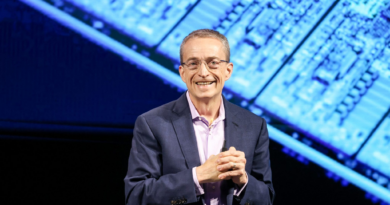Corporate adoption is turbocharging the AI market, says top tech analyst
Good morning. Big tech has been making headlines this week. For starters, OpenAI is raising even more money and shaking up its management structure to become more corporate as it digs in for what is shaping up to be a battle for AI dominance. Then there is Nvidia, whose CEO reminded businesses that his company is the only game in town when it comes to advanced AI chips—including the new Blackwell line, which is a top priority for many firms.
And speaking of Nvidia, the chip maker and professional services company Accenture announced an expanded partnership on Wednesday. Accenture will create what it calls an “Nvidia Business Group,” which will help clients lay the foundation for AI use with its AI Refinery platform built on the Nvidia AI stack. Nvidia Business Group will consist of 30,000 employees focused on assisting clients scale enterprise generative AI adoption.
I asked Dan Ives, managing director and senior equity research analyst at Wedbush Securities, what this move by Nvidia signifies. “We believe enterprise adoption of AI is one of the most important drivers of the market over the next few years,” Ives told me on Thursday. And $1 trillion of AI CapEx is on the horizon in the next three years with “the Godfather of AI Jensen and Nvidia torch bearers of this AI Revolution,” according to Ives.
During Nvidia’s earnings call in August, CFO Colette Kress said that the “Enterprise AI wave has started.” Enterprises drove sequential revenue growth for the company in the quarter that ended July 28, and Nvidia is working the most with Fortune 100 companies on AI initiatives, Kress said.
The fundraising news for OpenAI, the company that launched ChatGPT, came on Wednesday in the form of $6.6 billion in new funding, bringing the startup’s valuation to $157 billion. The company did not disclose the investors. But venture capital firm Thrive Capital had invested in and led this latest round, Fortune reported. Microsoft and Nvidia were also among the investors as well, Wedbush Securities analysts wrote in a Thursday note.
As a result of the funding round, OpenAI CFO Sarah Friar told employees on Wednesday that the company could offer a tender event to provide an option for liquidity, The Information reported. Friar, former CEO of Nextdoor, joined OpenAI in June. She also previously served as CFO of the tech company Square and oversaw its IPO.
The funding drive is happening as OpenAI overhauls its board structure to be a for-profit corporation accountable to shareholders, and as it contends with ongoing C-suite exits, including that of CTO, Mira Murati.
Wedbush analysts said in a Thursday note to investors that OpenAI has been the “linchpin” to AI success and adoption. “We also believe OpenAI now has a much more functional corporate structure which is a positive for the broader tech industry,” the analysts wrote.
Many CFOs are determining the business case for generative AI to help drive continuous change and create value. But, the rapid pace of technological change may be speeding up that process. And, the enterprise level is the beginning of a broader AI Revolution and demand adoption into 2025 and beyond, Wedbush analysts predict.
Have a good weekend.
Sheryl Estrada
sheryl.estrada@fortune.com
The following sections of CFO Daily were curated by Greg McKenna
Leaderboard
Some notable moves this week:
Selim Freiha was appointed CFO of Opendoor (Nasdaq: OPEN), an e-commerce platform for residential real estate, and will join the company’s executive team in November. He arrives from Google-parent Alphabet, where he served as a vice president leading corporate financial planning and analysis and previously headed finance for Google Commerce and Payments.
Jonathan Frates was appointed executive vice president and CFO of SandRidge Energy (NYSE: SD), an oil and gas company, effective Oct. 21. He will succeed current CFO Brandon Brown, who will assume the role of senior vice president and chief accounting officer. Frates has stepped down as the company’s chairman as he transitions to the new role.
Michelle Chang was appointed CFO of Zoom (Nasdaq: ZM), best known for its namesake video conference platform, effective Oct. 7. She will succeed current CFO Kelly Steckelberg, who will step down after seven years in the role following the company’s earnings announcement for its third-quarter ending Oct. 31.
Cassandra Harris was appointed CFO of Genesco (NYSE: GCO), the parent of footwear and apparel brands such as Journeys and Johnston & Murphy, effective Oct. 7. She will succeed Thomas A. George, who will retire on Dec. 12 after over thirty years as a public company CFO.
Brad Garner was appointed CFO of flyExclusive (NYSEAM: FLYX), which owns and operates private jets, effective immediately. Garner joins from Hale Partnership Capital Management, where he served as CFO and chief compliance officer since 2015.
Han Choi was appointed CFO of Vor Biopharma (Nasdaq: VOR), a clinical-stage biopharmaceutical company developing treatments for blood cancers, effective immediately. Choi previously served as a principal at Oracle Investment Management, a hedge fund that specializes in healthcare investments, where he spent over two decades.
Brad Smith was promoted to CFO of Central Garden & Pet Company (Nasdaq: CENT), effective Sept. 29. He succeeds Niko Lahanas, who has been named the company’s CEO. Smith joined Central in 2017 as CFO of the company’s pet division after 12 years at Delhaize Group, where he eventually served as CFO of European operations.
Morgan Conn was appointed CFO of Century Therapeutics (Nasdaq: IPSC), a biopharmaceutical company, effective Oct. 14. He most recently served as chief business officer of Pharvaris and previously spent almost 16 years at PTC Therapeutics, where he started as a researcher before transitioning into several senior business roles.
Big Deal
Almost 90% of consumers are frustrated with rising prices across categories including groceries, gas, and restaurants, according to a new report from marketing and printing company RR Donnelley. The firm surveyed over 1,800 consumers across different generations and income levels in partnership with Prosper Insights & Analytics, as well as over 254 decision-makers from U.S.-based grocery, drug, and mass retailers.
Those irritated by higher costs for everyday goods included 79% of households making over $100,000 per year, with 87% of baby boomers expressing concern over food and beverage prices. The report noted that consumers have adapted through several different strategies, including stocking up during sales and switching from name brands to private label products.
Unsurprisingly, fair prices are the most important factor consumers weigh when choosing where to shop, with 58% of respondents saying they prioritize affordability. Thirty-nine percent, however, said data privacy concerns influence their retailer and brand selection, up 19 points from 2023.
“Price sensitivity is a collective concern, presenting both a challenge and an opportunity for brands,” said Beth Johnson, director of client strategy in RRD’s grocery & convenience division. “To address this, we recommend that brands focus on offering value through personalized offers and relevant discounts. These strategies will help them adapt to shifting priorities, stay relevant, and strengthen customer loyalty.”
Going deeper
Here are a few Fortune weekend reads:
“WNBA commissioner Cathy Engelbert is leading the league to historic highs. Critics wonder if she’s fully seizing the moment,” by Emma Hinchliffe
“Who has time for a power lunch? The real business happens at 4 p.m. ‘power hour.’” by Jane Thier
“There’s already one clear election winner: The company making hats for every major candidate,” by Sasha Rogelberg
“AI could be giving natural gas a second lease on life,” by Richard Lum
Overheard
“AI data centres will be built next to energy production sites that can produce gigawatt-scale, low-cost, low-emission electricity continuously. Basically, next to nuclear power plants.”
— Yann LeCun, chief AI scientist at Meta, recently wrote in a post on X about rising demand for nuclear power as tech companies rush to fill their massive energy needs to run AI data centers, the Financial Times reported.




